COOPERATION MODEL
ARTIFICIAL INTELLIGENCE
PRODUCT ENGINEERING
DevOps & Cloud
LOW-CODE/NO-CODE DEVELOPMENT
INDUSTRY
FRONTEND DEVELOPMENT
CLOUD DEVELOPMENT
MOBILE APP DEVELOPMENT
LOW CODE/ NO CODE DEVELOPMENT
EMERGING TECHNOLOGIES







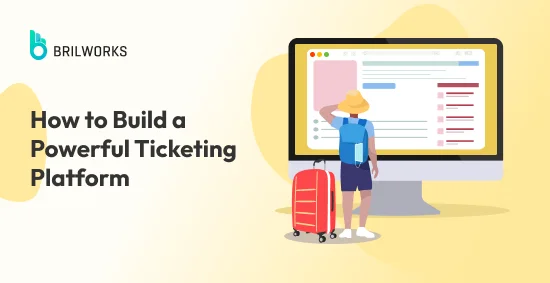
The rise of the internet and surge in smartphones have the online ticket reselling industry. Today, most venues actively encourage online ticket purchases for convenience and broader reach.
Many businesses, including event organizers and businesses selling products or services like travel and tourism, fitness and wellness studios, and restaurants, can significantly benefit by building a ticketing website.
This article aims to provide a comprehensive manual on creating a ticketing website and a step-by-step plan for effectively creating a modern ticket booking platform.
We'll explore modern approaches, walk you through the development process, and provide a checklist to help you minimize your development cost. By the end of this article, you'll have a clear roadmap for creating a successful online ticketing platform by the end.
Consequently, building a successful ticketing website requires a deep understanding of constantly evolving regulations and a meticulously planned architecture. It shouldn't simply be a ticket-booking platform; it must stand out.
Simply launching a basic platform won't give you an edge. You should strategically design and implement unique features that differentiate you from the competition.
Different businesses have different needs when it comes to building a ticketing website. What works for one might not work for another. That's why clearly defining your goals and objectives from the start is crucial.
This will serve as your blueprint and help you make informed decisions throughout the project, ultimately preventing any unnecessary spending.
When your visions are ready, you can pick the right solution.
For example, your objective is to build a basic ticket website and quickly launch it to market with less control over its core features. In that case, you can either opt for ticketing website builder apps or go for white-label solutions.
However, if you want to build a website that incorporates several modern features and has better control over each and every part of this website, you could choose a custom development.
The selection of an appropriate development approach depends on several factors, such as your existing technical expertise, the presence of an in-house development team, financial considerations, the desired level of features (basic or advanced), and the scalability requirements of your website in alignment with your business growth.
To streamline this decision-making process, consider the following checklist to define your objectives. Once you have outlined these requirements, you can then explore various development approaches for creating a ticketing platform that caters to the diverse needs of different businesses:
1. Technical Skills: If you have an in-house team for the project. Assess your team's proficiency in different programming languages and frameworks and evaluate the compatibility of your team's skills with potential development approaches.
2. Budget Constraints: Define your budgetary constraints for the ticketing platform development; this will help you choose the right development approach.
3. Feature Requirements: Identify and prioritize the features needed for your ticketing platform and classify features as basic or advanced to align with your business goals.
4. Scalability Needs: Evaluate the scalability requirements of your website concerning potential business growth.
5. Timeline: Define the project timeline and delivery deadlines.
6. Security and Compliance: Determine any specific security and compliance requirements for the ticketing platform.
7. User Experience: Consider the user experience expectations for your ticketing platform.
8. Integration Needs: Identify any third-party integrations required for your ticketing platform.
9. Maintenance and Support: Evaluate the long-term maintenance and support needs of the platform.
Once you have completed this checklist, you can use the information to guide your decision-making process and determine the most suitable development approach and tech stack for creating a robust and effective ticketing platform.
The popular devlopment approaches include website builders, white label solution and custom development.
This is the easiest option for beginners, as it requires no coding knowledge. Popular website builders like WordPress, Wix, and Squarespace offer plugins specifically designed for online ticketing. These plugins typically cover basic features like event listings, ticket sales, and attendee management.
Pros: Easy to use, no coding required, affordable for basic needs.
Cons: Limited customization options may not be suitable for complex ticketing needs.
Many companies, such as TicketSpice, EventZilla, and Accelvents, offer dedicated event ticketing platforms with a wider range of features than plugins. These platforms are ideal for more complex events or businesses that need features like advanced seating charts, tiered pricing, and marketing tools.
Pros: Wide range of features, good for complex ticketing needs, often scalable to larger events.
Cons: It can be more expensive than plugins and may require some technical knowledge.
This option offers the most flexibility and customization but also requires the most technical expertise. You'll need to code the website yourself or hire a developer and integrate a ticketing system separately.
Pros: Completely customizable, ideal for highly unique needs.
Cons: Requires coding skills, or hiring a developer can be expensive and time-consuming.
Off-the-shelf and custom development solutions are the go-to choices when targeting a wider marketplace, as both approaches provide greater control over website builder tools.
Custom development is particularly superior when aiming to compete among the top players. With this approach, you can work on innovative features to make your product stand out and stay ahead of the competition.
Major websites opt to build websites from scratch either with an in-house team or by outsourcing a company to do the same. Both approaches are good to go.
The major advantage of custom development is that you can continually scale and enhance your application in an ever-changing tech space, from migrating to the most secure tech stacks to adapting to new regulatory compliance.
On the other hand, if you choose to have pre-built solutions, you may need to rely on the service provider, limiting you from upgrading your application.
If you want to build your own website from scratch, below is a comprehensive guide for businesses to successfully develop it.
Major businesses often lack a clear understanding of software development costs. When they engage with a software development company, they frequently end up exceeding their projected budget.
This commonly happens due to inadequate planning. Proper planning should start by defining your objectives with the solution you plan to develop.
1. What type of tickets will you sell? (Events, tours, classes, etc.)
2. What features are essential? (Booking calendar, seating selection, promo codes)
3. Who is your target audience? (Tech-savvy millennials, corporate clients)
4. What's your budget and timeline?
When your objectives and goals are prepared, it is time to delve into the website development process.
The next crucial step involves focusing on user experience, which is achieved through the use of the right tools, a maintainable codebase, and incorporating trending features. These elements not only capture the audience's attention but also contribute to successful marketing and hosting of events, all powered by technology-based solutions.
When you set out to develop a standout platform, the tech stack and user experience play a significant role in the product's success. The right tech stack enables you to incorporate modern features over time, thus equally contributing to the users' experience.
Beyond the tech stack, the design of your application is crucial. This is where you should dedicate a significant portion of your time, as it directly communicates with your end users. This also encompasses the core functionalities of your app. Below are the key features you should consider implementing.
Instead of simply creating wireframes and mockups, work on developing a dashboard that is not only clear and intuitive but also captivating and engaging for users. Additionally, there are many features we could add that cannot be summarized in one article; however, when designing the user experience, you should focus on developing out-of-the-box features.
Here's an example of how we transformed the platform by tweaking existing features, leading to a drastically streamlined check-in process, enhanced lead capturing, and an immersive experience for both hosts and attendees.
Brilworks has an impressive portfolio of over 120 successful products across the globe, including event booking platforms. In one client project, we began by improving core features, ultimately enabling them to manage a staggering 100,000+ sessions with ease.
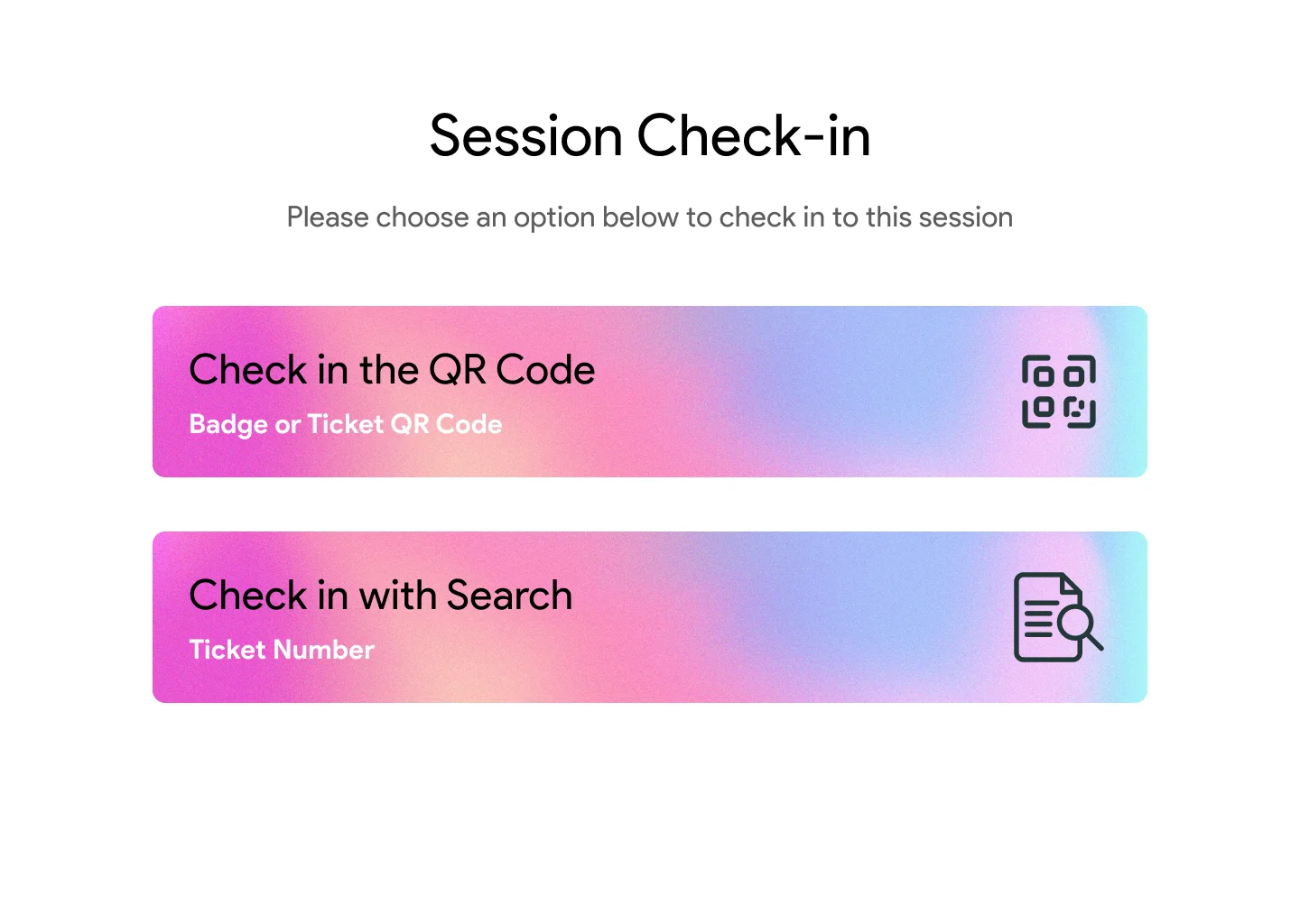
We made check-in a priority, focusing on streamlining the process for both organizers and attendees. We achieved this by developing three check-in modes: self-service, assisted, and online. These options have significantly reduced the burden on organizers, eliminating the need for a large check-in team.
Furthermore, We understand that post-event lead capture is critical for event hosts to measure their success and understand their audience.
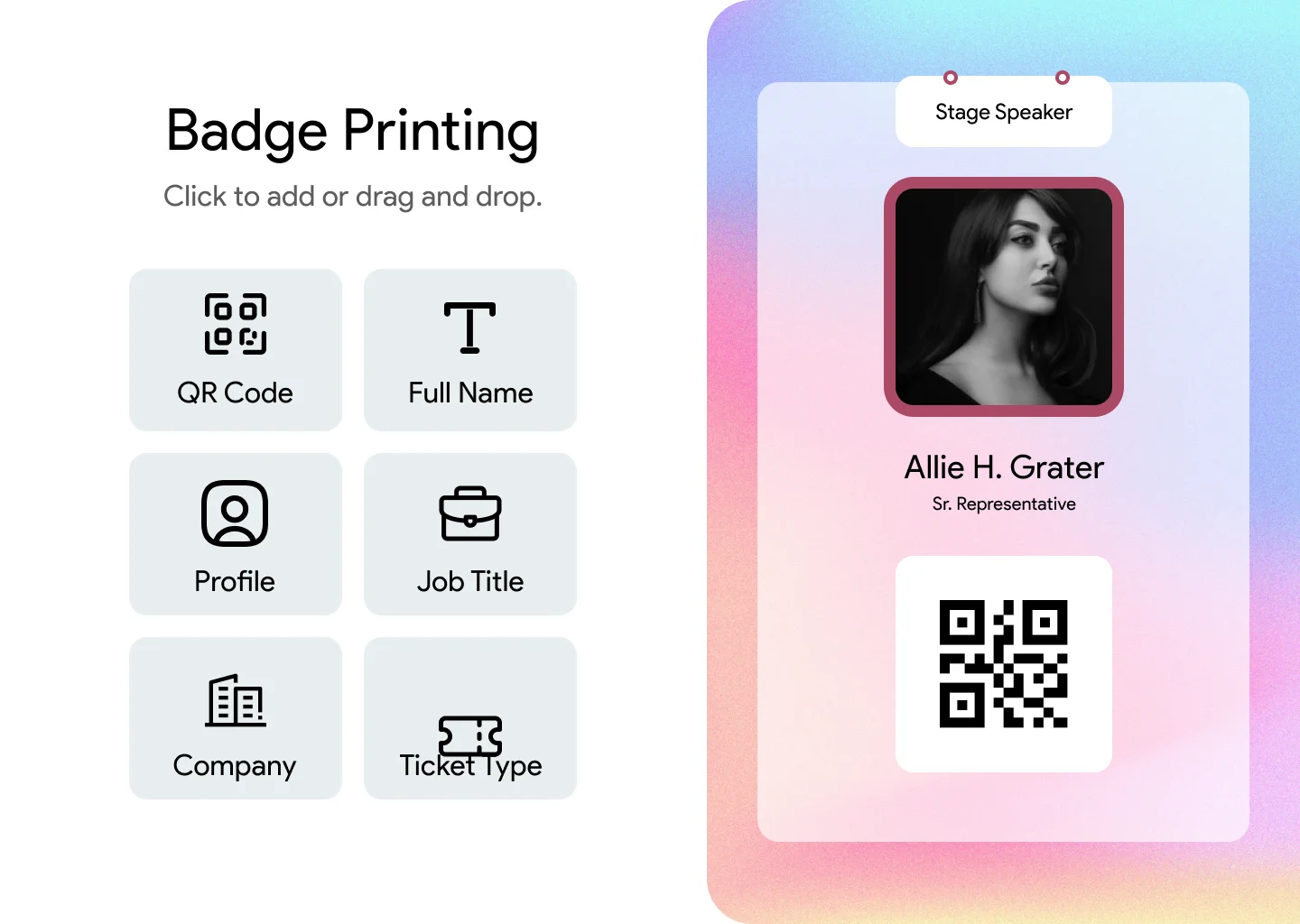
That's why we implemented a robust analytics mechanism that allows for seamless third-party integration so they could easily extract their event data in your preferred platform.
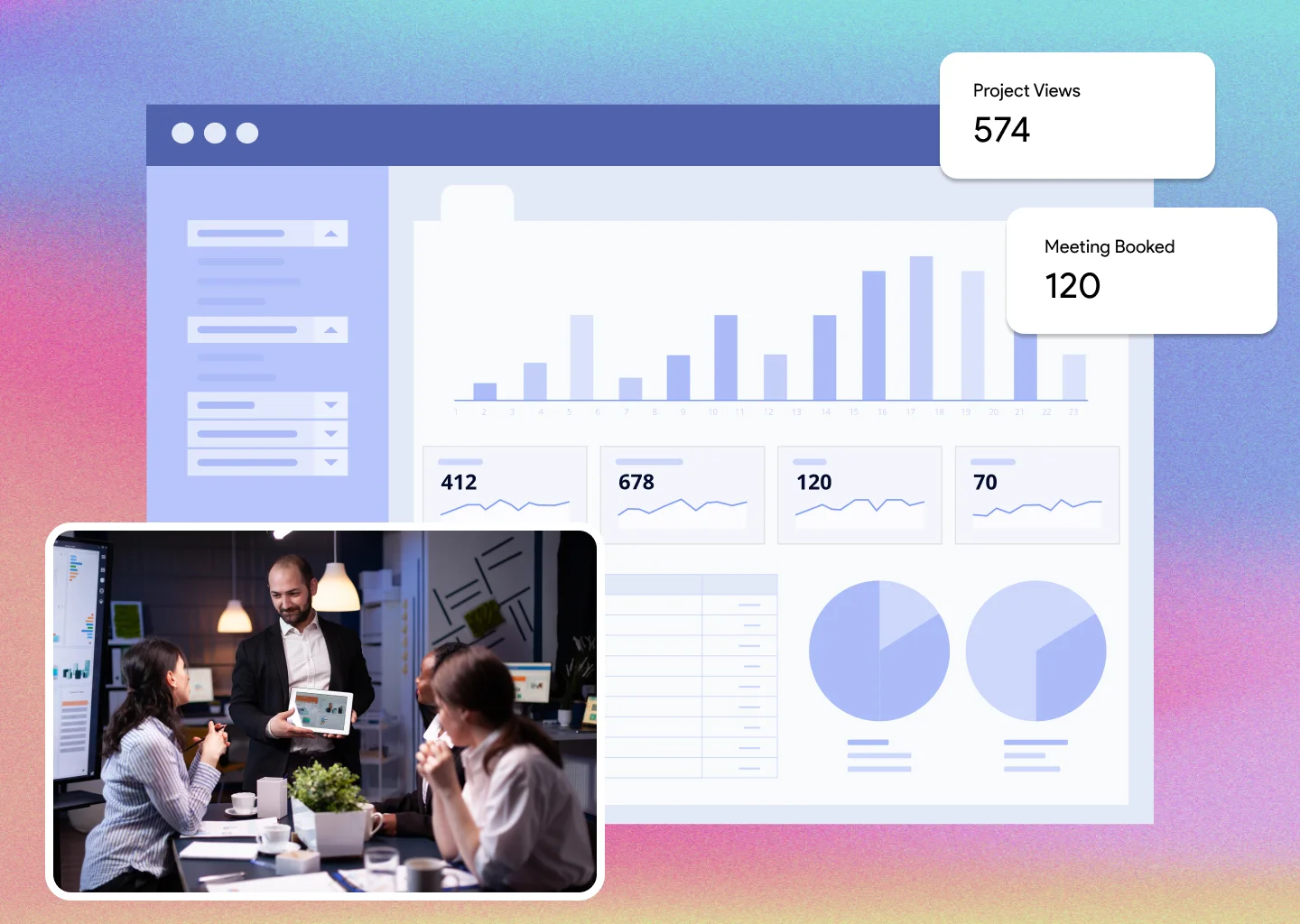
Not only did we offer a streamlined event booking platform, but we also elevated the attendee experience with an immersive virtual environment.
This environment features virtual event lobbies, round tables, lounges, and ad hoc chat functions, fostering meaningful connections and maximizing engagement during breaks and free time.
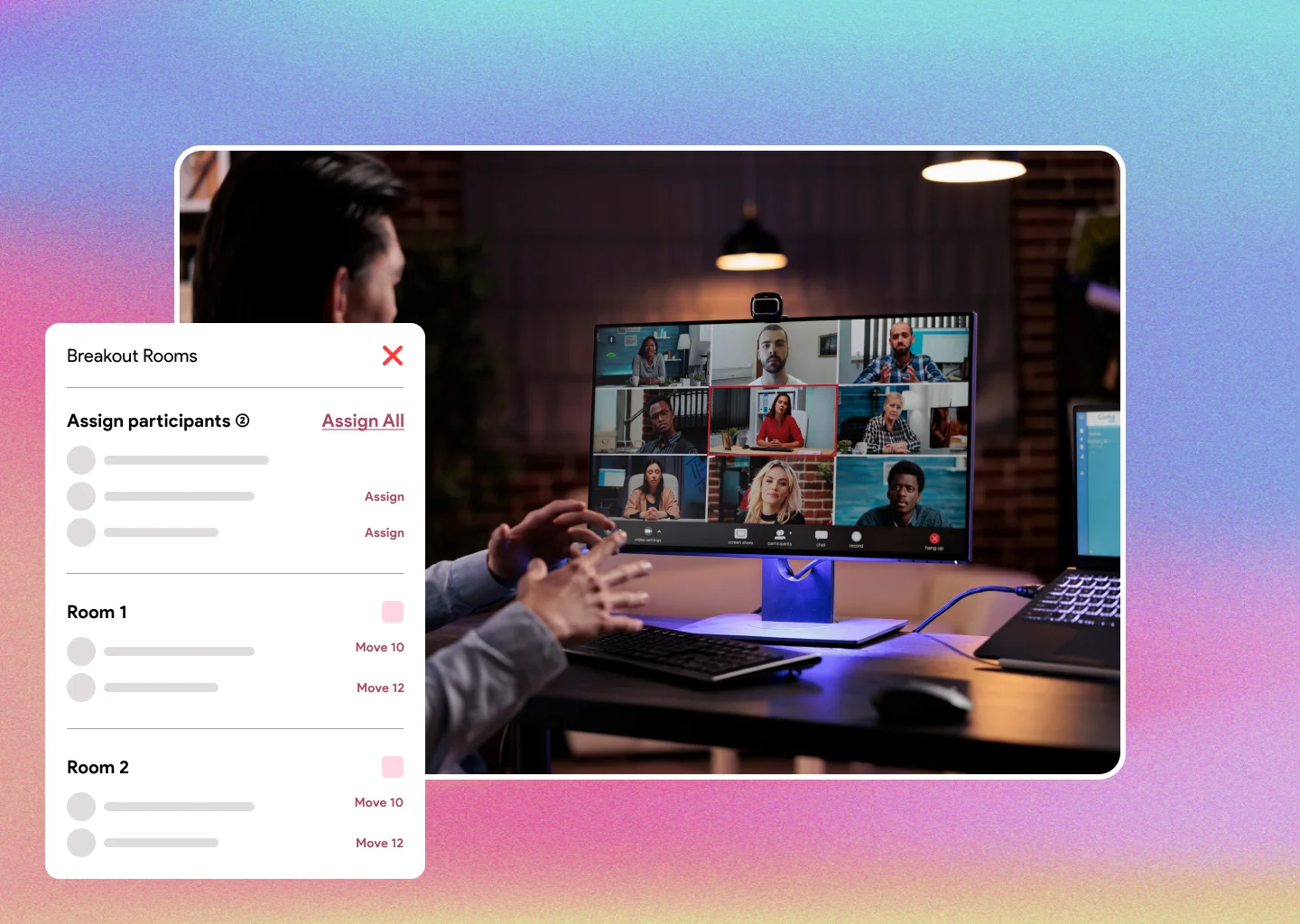
Additionally, our tag-based event matchmaking tool helps attendees find like-minded individuals, further enriching their experience.
Though the selection of tech stack depends on your budget and needs, below are some popular options to create a highly-performant ticketing application.
React: The most popular JavaScript-based front-end framework for creating dynamic UIs by Facebook. It offers a component-based structure and a rich ecosystem of libraries. Useful for complex, interactive interfaces.
VueJs: Progressive framework with a gentle learning curve, ideal for rapid development and single-page applications (SPAs).
Angular: Robust, structured framework by Google, suitable for large-scale, enterprise-level applications.
jQuery: Mature library for manipulating the DOM and handling events, often used for legacy projects or quick fixes.
Bootstrap: Popular CSS framework for responsive design and pre-built UI components.
Mobile-first approach: Responsive design or dedicated mobile app development using React Native or Flutter.
Accessibility: WCAG compliance for inclusive user experience.
Performance optimization: Techniques like code splitting and lazy loading for smooth performance.
For backend development, you can consider Python, Java, or Node.js.
Python: Versatile and developer-friendly, commonly used with frameworks like Django and Flask for web development.
Node.js: JavaScript-based runtime environment, popular for APIs and real-time applications.
Java: Mature and enterprise-grade, suitable for high scalability and security.
PostgreSQL: Open-source, relational database with advanced features, ideal for complex data models.
MySQL: Widely adopted, open-source relational database, suitable for most projects.
MongoDB: NoSQL database for flexible data schema and scalability.
Security: Secure coding practices, authentication, and authorization mechanisms.
Scalability: Choose technologies that can handle your expected traffic growth.
API integrations: Integrate with ticketing providers, payment gateways, and other relevant services.
Cloud Hosting: Platforms like AWS, Azure, or Google Cloud offer scalability, reliability, and security.
Payment Gateways: Stripe, PayPal, etc., for secure online transactions.
Email Marketing Tools: Mailchimp, SendGrid, etc., for user communication and marketing campaigns.
Analytics Tools: Google Analytics, Mixpanel, etc., to track user behavior and improve the platform.
Need a development team but lack the resources? We offer flexible models like dedicated teams and fixed-price or time & material options to fit your needs.
When you choose us, we will plan from start to finish and provide you with guidance on how to get started. Additionally, we will create a valuable checklist to build a well-planned application.
We will also assist you with a rapid application launch. If you are still unsure, you can talk to our experts. This consulting service includes selecting the right tech stack, identifying the most demanded features in the ticketing industry, and analyzing existing projects if you plan to modernize your existing platform.
Brilworks is a top-rated software development company with over 8 years of experience in software development, including renowned event booking platform development. If you require dedicated support for your project development, contact us today for a free consultation.
Almost every industry is walking towards digitalization, which is why almost every kind of event is already available on event-booking platforms. E-tickets are becoming a new norm, offering great convenience to both event hosts and end customers.
In 2022, the global online ticketing market was valued at USD 55.40 billion, which is expected to almost double by USD 64 billion by 2031. Sports events are the biggest contributor to this industry, followed by the music industry. This presents a lucrative opportunity for businesses to build innovative ticketing platforms for concerts.
While the booming online ticket reselling industry offers attractive opportunities for businesses entering the scene, it also presents several significant challenges: Regulation and legality, technology and competition, operational complexities, etc.
This comprehensive guide delves into the intricacies of building a ticketing platform to help you make informed decisions and navigate development seamlessly. We have outlined key considerations to ensure your platform is feature-rich, budget-friendly, and delivered on time.
Still have questions? Don't sweat it! Our expert is here to bridge the gap. Simply fill out the form, and we'll connect you with a dedicated consultant within 24 hours. As a bonus, startups receive a free initial consultation to help lay the groundwork for their digital solution and empower them to achieve tech-driven success.
We believe technology is a game-changer. It has the potential to skyrocket your business productivity and contribute to a better world. That's why we're passionate about helping you leverage the power of custom software development services to build a ticketing platform that's tailored to your unique needs and propels your business forward.
1. How to create a ticketing website?
You can create a ticketing website by opting for website builder tools, purchasing white-label solutions, and then rebranding them. Alternatively, you can integrate ticketing APIs if you prefer not to develop a ticketing platform from the ground up. However, if you want total control over your platform, custom application development is the better choice. It gives you the ability to scale and incorporate innovative and tailored features.
2. Which tech stack is built for developing an online ticketing system?
The choice of the technology stack depends on various factors such as project requirements, team expertise, and budget. Commonly used technologies for front-end development include HTML, CSS, and JavaScript, often coupled with frameworks like React, Angular, or Vue. For backend development, languages such as Python, Node.js, and Java are frequently utilized.
3. How can I identify the best ticketing system for my specific business needs and industry?
There is no one-size-fits-all solution, as the selection of the right tools and technology depends on business needs, budget, features, and the industry for which you are planning to develop a solution. Several companies offer free consultations or can help plan the right approach for your product development.
Get In Touch
Contact us for your software development requirements
Get In Touch
Contact us for your software development requirements